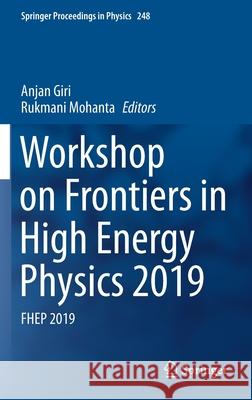Workshop on Frontiers in High Energy Physics 2019: Fhep 2019 » książka



Workshop on Frontiers in High Energy Physics 2019: Fhep 2019
ISBN-13: 9789811562914 / Angielski / Twarda / 2020 / 471 str.
Workshop on Frontiers in High Energy Physics 2019: Fhep 2019
ISBN-13: 9789811562914 / Angielski / Twarda / 2020 / 471 str.
(netto: 766,76 VAT: 5%)
Najniższa cena z 30 dni: 771,08
ok. 16-18 dni roboczych.
Darmowa dostawa!
Part 1: Gravitation and Cosmology.- Chapter 1. Re-visiting gravitational wave events with pulsars as Weber detectors.- Chapter 2. Effective chemical potential in spontaneous baryogenesis.- Chapter 3. Ferromagnetic instability in PAAI in the sky.- Chapter 4. The phenomenology of modified gravity models.- Chapter 5. Unique contributions to the scalar bispectrum in ‘just enough inflation’.- Chapter 6. Flavons and Baryogenesis.- Chapter 7. Spontaneous baryogenesis in quintessential inflation.- Chapter 8. Primordial Black Holes from Warm Inflation.- Chapter 9. Criticality of Charged AdS Black Hole with a Global Monopole.- Chapter 10. Effect of Global Monopole on the Microscopic Structure of RN-AdS Black hole.- Chapter 11. Diffusion coefficients and constraints on hadronic inhomogeneities in the early universe.- Chapter 12. Interacting Quintessence Model and Accelerated Expansion of the Universe.- Chapter 13. Quantisation of κ-deformed Klein-Gordon field.- Part 2: Colllider and Physics beyond the Standard Model.- Chapter 14. Recent results in small systems from CMS.- Chapter 15. Dark sector searches at the CMS experiment.- Chapter 16. Dark matter searches at the CMS experiment.- Chapter 17. Beyond MET: long-lived particles at the LHC.- Chapter 18. UV Origin of Discrete Symmetrie.- Chapter 19. Pathways to unification with Vector like fermions.- Chapter 20. Higgs Vacuum Stability with Vector-like Fermions.- Chapter 21. Phenomenology of two Higgs doublet model with flavor dependent U(1) symmetry.- Chapter 22. Signatures of GW from an extended inert doublet model.- Chapter 23. Relaxed constraints on masses of new scalars in 2HDM.- Chapter 24. Charged Higgs Discovery Prospects.- Chapter 25. Some compelling overview of charged particle multplicity distribution in pp collisions at the LHC.- Chapter 26. Polarization of Z boson as a probe of anomalous gauge-Higgs couplings.- Part 3: Astroparticles, Neutrinos and Dark Matter.- Chapter 27. Astronomical probes of ultra light dark matter.- Chapter 28. Extragalactic Neutrinos: A window to new physics.- Chapter 29. UV-IR freeze-in of a fermionic dark matter and its possible x-ray signature.- Chapter 30. Recent results from GRAPES-3 observatory.- Chapter 31. Dark matter mass in extra U(1) gauge model.- Chapter 32. 0νββ signature in LRSM with Higgs bidoublet and doublets.- Chapter 33. Sterile neutrino in minimal extended seesaw with A4 avour symmetry.- Chapter 34. Origin of dark matter and baryon asymmetry of the Universe in an A4 flavor symmetric neutrino mass model.- Chapter 35. eV scale sterile neutrino and dark matter phenomenology in A4 ×U(1)B−L model.- Chapter 36. Type III Seesaw and Two-component Dark Matter in U(1)B−L Model.- Chapter 37. Δ(27) flavor model within type–II seesaw and associated phenomenology.- Chapter 38. Mass and life time of heavy dark matter decay into IceCube PeV.- Chapter 39. Constraints on ultra light dark matter from compact binary systems.- Chapter 40. Viscous dark matter and its implication for 21-cm signal.- Chapter 41. Implications of neutrino mixing data on hierarchical texture 2 zero mass matrices.- Chapter 42. Study of texture zeros of Mν4×4 in Minimal Extended Seesaw mechanism.- Chapter 43. Eects of nonstandard interactions on coherence in neutrino oscillations.- Chapter 44. Lorentz invariance violation and Long Baseline Experiments.- Part 4: QCD and Heavy Ion Physics.- Chapter 45. Do Proton+Proton collisions at the LHC energies produce Droplets of Quark-Gluon Plasma?.- Chapter 46. Parton Distributions and Spin Structure of Hadrons.- Chapter 47. A Study of Transverse Single Spin Asymmetry in Hadroproduction and Electroproduction of J/ψ.- Chapter 48. Shear viscosity and vorticity patterns in relativistic heavy ion collisions.- Chapter 49. The 3-D structure of kaon in light-cone quark model.- Chapter 50. Quark Wigner distribution and GTMD of pion using soft-wall AdS/QCD wavefunctions.- Part 5: Heavy Flavour Physics.- Chapter 51. Global Fits of B Decay Anomalies.- Chapter 52. Beam-constrained vertexing for Bphysics at the Belle II Experiment.- Chapter 53. New Physics solutions for b → cτ ν¯ anomalies after Moriond 2019.- Chapter 54. Analysis of B¯ →Dτν¯τ decay modes.- Chapter 55. Effect of new physics in B¯ →ρℓν¯ℓ decay process.- Chapter 56. Exploring lepton flavor universality violation in Bs → Ds∗ l ν decay.- Chapter 57. Model independent study of LFUV in Σb →Σcτν and Ωb →Ωcτν baryonic decays.- Chapter 58. Test of LFU in B → Kℓℓ decays at Belle.- Chapter 59. Search for the decay Bs0 −→ π0π0 at Υ (5S) resonance using Belle detector.- Chapter 60. New physics effects on Bs → K+K− decay mode.- Chapter 61. Analysis of b →sγ transition in VQM model.
Anjan Giri is a Professor of Physics at the Indian Institute of Technology Hyderabad. His work focuses on B Physics, CP violation, neutrino physics and looking for signals of physics beyond the standard models using experimental data. He has published more than 100 highly cited papers in international journals with and is a member of the NOvA and DUNE collaborations at Fermilab, USA and the Belle collaboration at KEK, Japan. He is known for his widely used GGSZ (Giri-Grossman-Soffer-Zupan) method for the determination of CKM phase g.
Rukmani Mohanta is a Professor of Physics at the University of Hyderabad. Her work focuses on phenomenological aspects of flavor physics, neutrino physics, dark matter, and the interplay between the data and theory beyond the standard model scenarios. She has published more than 100 highly cited papers in international journals. She is the recipient of the Elsevier Foundation 2011 OWSD (Organization for Women in Science for the Developing World) award for Physics/Mathematics in the Asia-Pacific region, and is a member of the NOvA and DUNE collaborations at Fermilab, USA.
1997-2026 DolnySlask.com Agencja Internetowa
KrainaKsiazek.PL - Księgarnia Internetowa









